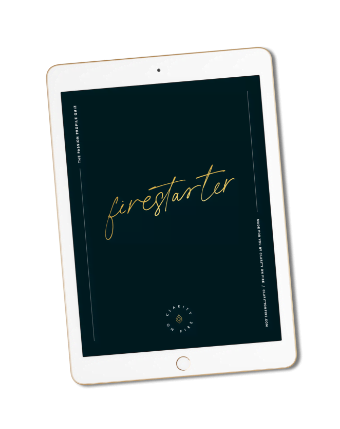If reading long blogs just isn’t your deal, you can listen to me read it instead!
(Click the orange play button to start playing right here on the page, or download and save it for later by clicking the downward arrow at the top right of the box below.)
On our latest coaching call, my client Renee started out by saying:
“I feel like every day at work, I’m just reacting to all of the demands of everyone around me. I can easily spend a whole day responding to emails, answering phone calls and texts, doing things for people who stop by my desk, and going to meetings. Which means I have hardly any time or energy leftover for the important projects that need my attention, but aren’t as time sensitive. I hate feeling so reactive like that, but how do I not get so caught up in putting out fires all day every day??”
Sound familiar? I know it does for me!
I always go into the day knowing what I most want to work on … but despite my best intentions, some days it’s easy to get caught up in emails, social media, texts, calls, etc., that feel like they need my attention or response right now.
And those bigger-picture, less time-sensitive projects? They tend to get put off until tomorrow … and then the day after that … and the day after that.
It’s not that I mean to procrastinate on those things, but that’s what ends up happening sometimes because other things swoop in and steal my attention.
I told Renee, “First of all, you are SO not alone! I’m pretty sure everyone gets caught up in this trap sometimes. The key to breaking this pattern is to know the difference between what’s urgent and what’s important, and get your priorities straight between the two.”
SO HOW DO I TELL THE DIFFERENCE BETWEEN WHAT’S “URGENT” VS. WHAT’S “IMPORTANT”?
Let’s first define what the difference is between what’s “urgent” and what’s “important,” so we’re all on the same page.
You can tell when something is urgent because it feels like there’s a ticking time clock on it, waiting for you to do something about it.
When an email lands in your inbox, the countdown begins based on your (or your company’s) idea of an “appropriate” timeframe for responding. You know someone is on the other end waiting for a response, so it feels like you should answer ASAP.
When a coworker stops by your desk and asks if you can check on something for them, you feel like you should drop everything you’re doing and get them an instant answer.
When your sister calls to ask for advice about her kitchen remodeling, you feel like you should skip your evening yoga class so you can give your two cents right then.
Things that are urgent often come from other people’s agenda, not our own.
Important things, on the other hand, are most often your own dreams and goals, the things that matter most to you.
You might have a dream of writing a book … or a goal of working out more regularly … or a vision of side business you want to start … or a desire to start a new initiative at work … or an interest in starting a meditation practice.
Those things — the important things — aren’t as in-your-face critical in your everyday life. They’re the things you always want to make time for, but they end up getting pushed to the wayside.
THE URGENT STUFF CAN WAIT
What happens when you let the “urgent” things steal all of your time away from the important things? Burnout, resentment, and a lack of fulfillment.
And when you’re feeling that way, your motivation, energy, and inspiration take a nosedive. Which means you’re not able to support the people around you as well as you could, plus you have no energy leftover for the things you care about. It’s a total lose-lose.
![]() Taking care of everyone else’s needs 24/7 is a form of self-betrayal.
Taking care of everyone else’s needs 24/7 is a form of self-betrayal.
The truth is, unless you’re an ER surgeon or your house is on fire, the urgent things in your life can wait.
Rachel and I always remind each other, “There’s no such thing as a life-or-death coaching emergency.” The same is most likely true of your industry, too.
{Hats off to all of our doctors, military servicemen, firemen, police officers, and all of the people who DO deal with urgent, life-or-death situations everyday. For them, urgent and important are the same thing.}
A while back, a client told me that they had a coworker who put this sign on their office door: “Unfortunately, a lack of planning on your part does not constitute an emergency on mine.”
Blunt, but 100% true! That’s a tough-love way of not getting caught up in other people’s “urgent” agendas.
THE IMPORTANT STUFF COMES FIRST
So how can you start to shift your life to focus more on what’s important and get less caught up in the urgent stuff?
This quote from author Steven Pressfield sums it up perfectly:
“I’m keenly aware of the Principle of Priority, which states (a) you must know the difference between what is urgent and what is important, and (b) you must do what is important first.”
As in, you do the important things before all of the urgent stuff has a chance to swoop in and steal away your attention.
If you try holding off on the important things until after your urgent work is done, chances are you’ll never get to them. Because the urgent stuff? It never ceases.
Remember my client Renee I mentioned earlier? I asked her to try out an experiment for one week:
Each day when she got to work, she wasn’t allowed to check her email or answer the phone for the first hour of her morning. That hour was dedicated solely to the important projects that had been getting crowded out by all of the urgent stuff. She even told her boss about this experiment, so he wouldn’t wonder why she was digitally MIA for that first hour.
The next week, she came back saying she hadn’t felt so ahead of things at work in recent memory.
So look at your to-do list (or write it down if it’s just a running list in your head) and mark each one as urgent or important. Then do at least one important thing before dealing with the urgent stuff.
OTHER WAYS TO PRIORITZE WHAT’S IMPORTANT
Set up “blackout hours.” These are times when you alert everyone around you — either at work or at home — that you’ll be laser-focusing on something important and you don’t want to be distracted. Shut down your email, turn your phone on airplane mode, and get to work!
Schedule the important stuff. As online business guru Marie Forleo is fond of saying, “If it’s not scheduled, it’s not real!” I want you to think of the important things on your calendar as immovable objects. Everything else — emails, chores, errands, social plans — have to work around those fixed blocks on your calendar.
Get some accountability. Find a way to stay accountable for the important stuff you really want to devote more time to. If you want to write a book, join a writing group. If you want to get into shape, hire a personal trainer. If you want to complete a project at work, tell your boss what day it’ll be done. (Psst, coaches make for great accountability partners, too! My clients say that’s one of the main reasons they keep taking action — because they know I’ll ask about it the following week.)
Automate the urgent tasks, when possible. There are so many ways now to automate and outsource stuff you don’t want to do. Seriously, there are delivery services for just about everything nowadays. There are even automated virtual assistants who can do your scheduling for you. So don’t feel like you need to do all of it yourself!
This is what it looks like to set your own agenda, instead of waiting for it to be set for you. It’s time to take back control of your time.
Did this strike a chord with you? How will you start to prioritize what’s really important? Leave a comment to let me know!
IF YOU LIKED THIS, THEN YOU’LL ALSO LOVE …
How to create more time in your day
How to feel more energized at work (& generally in life)
Are you addicted to being busy? Or do you just love getting things done? How to tell the difference
When you haven’t made as much progress in life as you wanted
Much Love,
Kristen (& Rachel)



This is so powerful and resonates so much. Love you ladies, you always seem to post about what I’m struggling with or advice I need to hear right at that particular moment. In light of this post, I’m going to start scheduling time weekly to read and reflect on your posts because I’m discovering reading them is really important to me. (I always read them but I don’t always pick times when I can reflect/ ponder how it might apply to my life or how I can implement a habit). Sorry for the crazy long comment and thank you for always being an inspiration ????
Thank YOU, Jess! This comment made my day. 🙂
I love that we always seem to write about things you most need to hear at the moment — we must be sharing a brainwave or something. 😉 I also like your idea of scheduling time each week to read and really process each blog post. You’re going to get even more out of them that way! Glad we can provide a little spark of inspiration each week! Thanks for being such a loyal reader.